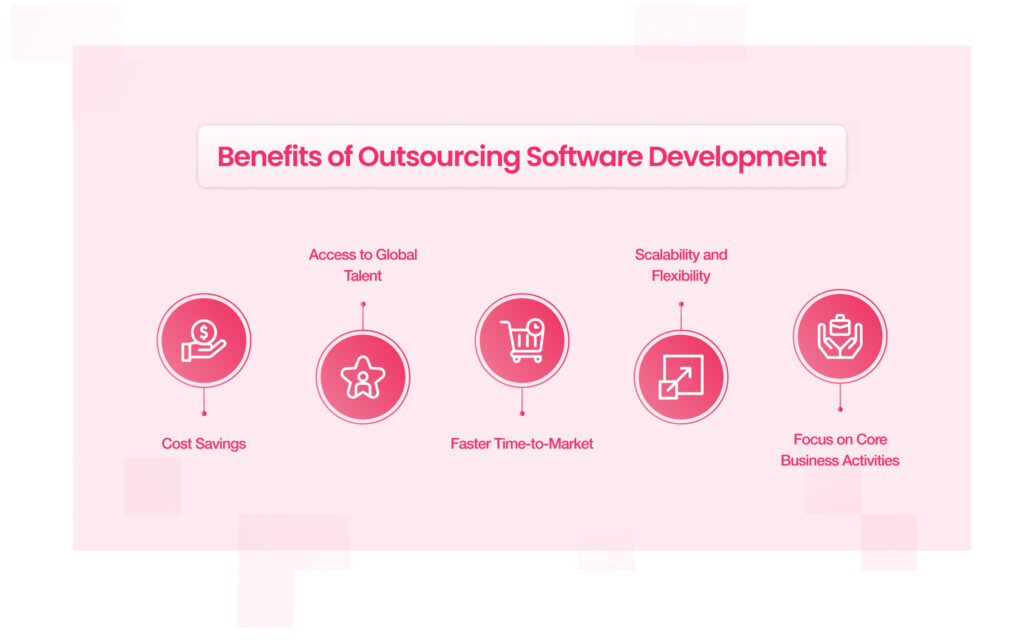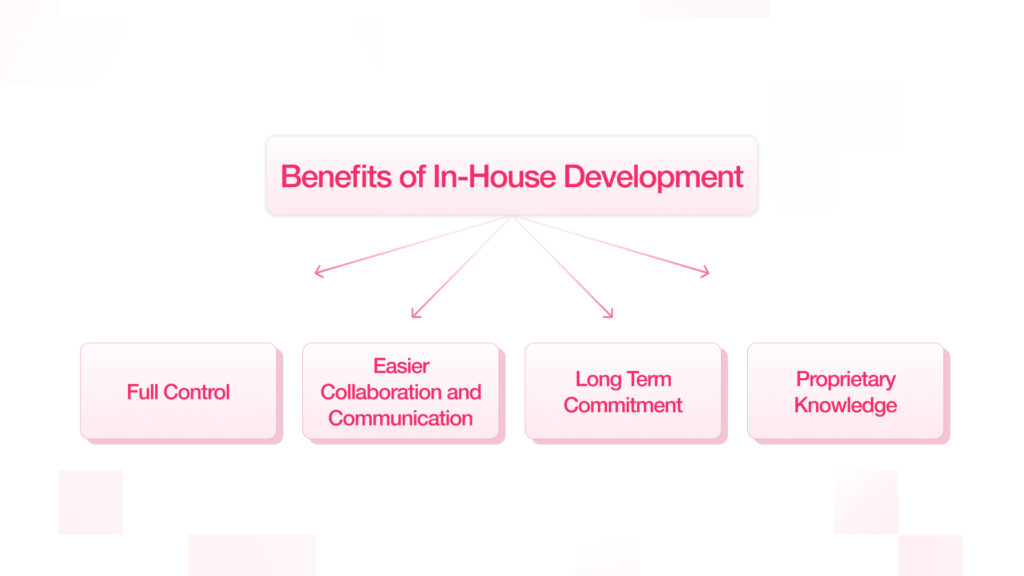Software Development Outsourcing vs. In-house Development: which works best?
When it comes to creating software, the decision about selecting between outsource software development vs in-house is among the most crucial for businesses. Each approach has pros and cons, and a proper understanding of these variables is indispensable for making the right choice. In the fast-paced environment of business today, it is not impossible that a business has to innovate and produce software solutions of high quality almost every now and then to stay competitive.
- March 13, 2025
- by Tarun


One of the most important decisions for every company is whether to outsource software development or build and recruit a dedicated in-house software development team. Software Development Outsourcing vs. In-house Development probably will have very significant implications on the budget, timeline, quality of the product, and overall success of the business.
This article touches on the pros and cons of both approaches and acts as a resource to companies that want to undertake informed decisions according to their unique needs and objectives.</p>
What do you mean by Software Development Outsourcing and In-house Development?
Software development outsourcing involves hiring external vendors to handle software development tasks, from initial design to programming and testing. It covers all aspects of development that take place outside the company’s office. Outsourcing gives a business access to a world of talent but could be very expensive. It also brings challenges like time zones and communication access.
In-house development means that the company hires and manages a dedicated team of software developers within the company itself. These developers usually work full-time during normal hours alongside the rest of the internal teams in developing software solutions themselves. The in-house teams are a fair deal when it comes to control over the development process. But such control comes with increased overhead costs and slow scalability.
Software Development Outsourcing
Outsourcing software development has become a growing trend in recent years among startups, small to mid-sized businesses, and large enterprises. It offers cost-effective solutions without compromising quality. The following list explains why many organizations consider outsourcing a good option.

Looking for a Partner in Your Software Development Journey?
We Can Help!
Cost Savings
Cost reduction is one of the top reasons businesses favor software development outsourcing. By hiring external developers from regions where labor costs are low, businesses stand to gain a significant advantage over hiring full-time in-house developers. Many companies outsource projects to countries like India, Ukraine, and the Philippines to access skilled developers. These developers provide high-quality work at a significantly lower cost than in high-priced markets like the U.S. or Western Europe.
General employment terms for outsourced workers should help the company reduce costs. This includes savings on recruitment fees, employee benefits, office space, and training expenses. For businesses with operating cash constraints, it can be very cost-effective for them.
Access to Global Talent
Another major advantage of outsourcing includes accessing global talent. Outsourcing allows companies to recruit personnel with a much wider range of skills and expertise than they could hire locally. This is very useful particularly for organizations that require some specialist knowledge or expertise in specific technology, framework, or industry.
To streamline the process, businesses hire developers with expertise in the specific technologies their projects require. This helps them avoid the time and effort needed to recruit and onboard an in-house team with those skills.
Faster Time-to-Market
Outsourcing can also speed up software development. External vendors typically have established workflows, development tools, and processes in place. This allows them to start the development process faster than an in-house team, which may need time to get up to speed. In addition, outsourcing enables companies to work with teams in different time zones. It ensures continuous development cycles and accelerates project completion.
Whether it be timely product marketing or pressing due dates, outsourcing offers significant timing advantages that can speed up a company’s time to market.
Scalability and Flexibility
Outsourcing is a means for businesses to rapidly scale their operations up or down in response to changes in project requirements. They can recruit extra developers to meet a deadline. Once the deadline has passed, they can reduce headcount if needed. Manage your project team by adjusting its size without carrying the burden of having to make permanent hires.
In-house development teams can have their limitations when it comes to speed because recruiting and training new professionals is resourceful and time intensive. On the basis of outsourcing, it permits flexible, agile project management and fast adaptation to business changes.
Focus on Core Business Activities
Outsourcing software development allows organizations to focus on core functions like marketing, sales, or customer service. It lets specialized teams handle technical matters, ensuring efficiency and expertise. Thus, the internal team could focus on only those areas where they add the most value and leave the balance to an external team for development.
Focusing on other parts of the organization’s activities through innovation and expansion drives the business initiative and breaks free from the daily details of software creation.
Need Reliable Software Development partner to help grow your Business?
Our Experts Can Help!
Challenges of Outsourcing Software Development
Outsourcing does pose some challenges, one such problem being communication and collaboration. Some of these problems are time zone differences, language barriers, and even cultural differences that could lead to misunderstandings and delays down the line, affecting the project completion time. Poor communication or misaligned expectations mostly lead to poor outcomes.
Apart from this, it brings quality control issues when dealing with outside teams. Although outsourcing companies generally have stringent rules, there may be times that the work delivered is not up to the expectations of the company. This is precisely why companies must carefully vet potential vendors and define project specifications upfront.
In-house Development
In-house development means that the business hires its own team of software developers that are employees of that company. The in-house team collaborates closely with the other departments, such as marketing, sales, and operations, to adapt the software to meet the company’s goals and vision. The list below highlights why in-house development may better suit certain organizations.

Full Control Over the Development Process
The most important advantage with developing software in-house is the level of control it imparts to the business over the entire development process. This aligns much of the development with the company’s vision and goals because everything from initiation to implementation is done within the organization. In-house developers work closely with internal stakeholders, ensuring the product meets the organization’s specific needs and requirements.
Such control over the process of developing usually means controlling the changes with speed in case of any problems or any changes to the priorities. An in-house team can usually respond faster to feedback since it is possible to fix most issues in real time.
Easier Collaboration and Communication
In-house teams usually work out of the same office or company location, thus allowing more direct and frequent contact-with which distance becomes irrelevant. This is most useful for those businesses needing departments to work closely together, reducing any likelihood of misunderstanding and misalignment.
In-house teams are also quite more integrated into a company culture; these further nurtures ownership and accountability among the employees. Developers tend to be motivated to deliver quality work because they feel closer to the company missions and values.
Long Term Commitment and Continuity
Having in-house programmers means that the company can be confident that they will follow a path to success with their company, and this in turn gives developers chances for long-term stability and continuity with their projects. This means that being employed more internally allows the development house to keep recruiting members who are oriented toward achieving the goals of the company because they themselves will have a better sense of the company’s long-term perspective.
Having an internal team available for ongoing support for maintenance, bug fixes, and software updates after launch creates the potential for simultaneous delivery of quick and consistent response times.
Customization and Proprietary Knowledge
The in-house teams have a very good understanding of the companies’ internal processes and systems that are best suited to building solutions closely aligned with company needs. This is what proprietary knowledge does for in-house developers, custom software development at best, and invisibly fit into the existing business process.
A clear advantage of in-house development is that they, too, understand in-depth the company’s industry and target market, due to which they can create software solutions to provide better service to customers.
Challenges in In-house Development
While there are many advantages to in-house development, it also comes with significant challenges. The most notable of these is cost. Hiring and retaining a skilled in-house development team can be expensive, especially when factoring in salaries, benefits, training, office space, and equipment. For smaller companies or startups, these costs can be prohibitive.
Regarding scalability, in-house teams will face their own share of challenges. Increasing a team when there are higher demands or new project requirements includes lengthy recruitment processes that can, in effect, delay project timelines. Furthermore, the business may lack specialized developers in certain technologies or domains.
Making the Right Choice
When selecting between these two options, Software Development Outsourcing and In-house Development, a business must consider various factors, such as project complexity and budget constraints, required control, and long-term objectives. The benefits of outsourcing include cost reduction, access to specialized talent, and the ability to quickly scale up or down; on the other hand, in-house development offers control, great collaboration, and long-term commitment.
The decision to select between outsourcing or in-house development would still be determined by the uniqueness of what individual companies want and need. Further, other companies may also have a mixed approach wherein some aspects of the development process are being outsourced while the remaining are being performed in-house.
Thus, when all of these factors are well considered, a company can make the decision that best suits its software development goals and will benefit the company in the long run.
Budget is yet another key consideration. Usually, outsourcing allows for cost savings, especially when working with vendors from countries with lower labor costs. However, businesses must also consider potential other hidden costs in connection to outsourcing, for example, communication hurdles, or overheads for managing remote teams. In-house development may incur higher initial costs, but it could also be more attractive for the company in the long term if continuous support and maintenance are required.
One important consideration is control and oversight levels needed. In-house team according to business needs if a high level of control in the development process is required. An outsourcing option provides a flexible and scalable solution if it is permissible to relinquish some control to outside experts.
Businesses must think about the software’s long-term perspective. It might make more sense to maintain an in-house team for continuous support when software is going to require regular updates, maintenance, or changes. For example, single projects and short terms can be more efficient and cheaper through external service hires.
Conclusion
Software development outsourcing vs in-house development is ultimately dependent on what a particular business requires. There will be a trade-off in regard to cost, access to specialized expertise, and quick scalability but it presents several challenges, such as communications issues and loss of control. On the contrary, a company would have more control and collaboration in developing in-house software but at a higher cost and with some scalability limitation.
To select the best fitting approach, businesses have to thoroughly analyze their project requirements, budget limitations, and long-term goals. Thus, they can select an alternative that best matches their requirements, and which can ensure successful development of their software.
 Shopify
Shopify













